Back to Biographies
Back to Missionaries
Born: March 25, 1898 in Mahtowa, Carlton Co., MN
Death: July 25, 1979 in Chattanooga, Hamilton Co., TN
Burial: Collegedale Memorial Park, Collegedale, Hamilton Co., TN
Findagrave: 92261811
Spouse: Dorothy Julia Kocher
Parents: Enevold Christian Christensen and Dorthea Marie Jensen
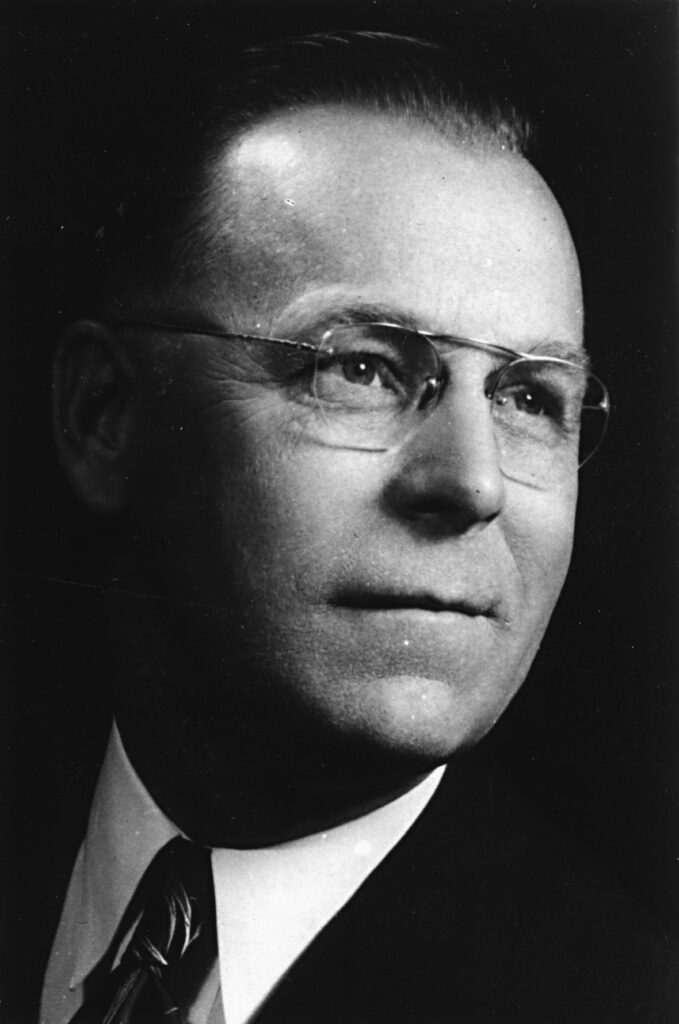
Photo: Center for Adventist Research
Collection 033, P000719
Obituaries:
Died: Otto H. Christensen, on July 25 in Ooltewah, Tennessee. His 40 years of service for the church included ten years in Mongolia and eight years as head of the religion department at Southern Missionary College. – Review and Herald, August 16, 1979, 24.
CHRISTENSEN, Otto H. – b. March 25, 1898, Mahtowa, Minn.; d. July 25, 1979, Ooltewah, Tenn. During his 40 years of service to the denomination he served in the following capacities: evangelist, Minnesota Conference; pioneer of the work in Mongolia, translating the Bible into Mongolian; district leader and pastor in the Michigan Conference; pastor, Illinois Conference; teacher, Emmanuel Missionary College; teacher and chairman of the division of religion, Southern Missionary College; and teacher at Andrews University. Survivors include his wife, Dorothy. – Review and Herald, September 20, 1979, 31.
CHRISTENSEN, Otto, born Mar. 25, 1898, in Mattawa [sic], Minn. Died July 25 in Chattanooga, Tenn. He received his Ph. D. from the University of Chicago in 1951. He was a missionary to China and Mongolia, having the Bible hand-copied in Mongolian and translating the Mongolian grammar into English. He organized the Wadena, Minn., church. He taught at Emmanuel Missionary College, at Andrews University, and was chairman of the religion department at Southern Missionary College. He authored the books, Getting Acquainted With God, Mission Mongolia, and was a contributing editor to the Seventh-day Adventist Bible Commentaries. He is survived by his wife, Dorothy, Collegedale; a son, Bruce, Berrien Springs, Mich.; a daughter, Ilene Caster, Fulton, N.Y.; two brothers, Dr. John, Collegedale, and Nels, Pensacola, Fla.; a sister, Olga Caster, Duluth, Minn.; eight grandchildren and two great-grandchildren. – Southern Tidings, September, 1979, 28.
Autobiography – Otto H. Christensen
(apparently written in late 1969, provided by granddaughter Judi Christensen-Doty)
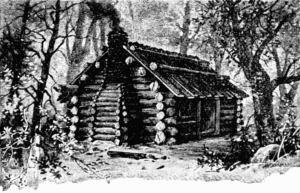
If being born in a log house makes a person famous, I should be. I was born in a homesteader’s log house in northern Minnesota. My father emigrated from Denmark as a young man in the year 1888, my mother coming two years later. They were both from farmer stock north of Aalborg, Denmark. When father arrived he took up a homestead of 80 acres about 30 miles southeast of Duluth near Mahtowa and worked in the timberlands in winter to provide cash and in summers cleared the land on the homestead and built a log house and barn.
I can still remember quite clearly one or two incidents at the log house even though I was only two years old when we moved to a new frame house on another part of the 80 acres. One of those incidents was my experience with an ugly rooster which took delight in chasing us children. My older brothers (I had four brothers and two sisters – I was next to the youngest) climbed up on a rail fence, but I was too small to do that so I got pecked and of course cried until mother rushed out with her hands full of dough, which she had been kneading, and gathered me in her arms. The other incident was in the fall when we moved what furniture we had to the new house.
Our public school was located right next to Park Lake about half a mile from home, the lake being only a quarter mile from our house. Here I learned to ice skate and in the fall we would skate to school as soon as it was frozen. Sometimes the ice would be so thin it would act like rubber under us. Stopping was dangerous. Sometimes we would lie at the edge of the ice and drink from the open water. I started school when I was five years old and have enjoyed study from then on. When I was a little older, I was given the job of opening the school and starting the furnace fire and keeping a supply of wood inside and tending the furnace. By the time I was 12 years old I had passed sufficient of the state tests to graduate from the eighth grade. But I did not wish to quit so early as I enjoyed school. So I continued on two more years until I was fourteen. I still look back with nostalgia at the old spell downs and literary debating clubs that we used to have in the community.
When I was about eight or nine years old, two Seventh-day Adventist ministers, Fred Johnson and O. J. Nerlund, held a series of meetings in our school house. Their meetings were quite well attended but only a few accepted their message, including my mother. She and my oldest brother and sister were baptized at that time. Father never was baptized although he believed it and quit his use of tobacco. When with others he always defended the message. On Sabbaths we would meet in the homes, each home taking its turn. So except when they met at our house, we would generally walk from four to seven miles each way. Sometimes, if the horses had not been working hard during the week, father would let us drive. It was at one of these home meetings at a communion service with no minister present that I definitely surrendered to the Lord and was baptized at the next camp meeting.
During those early years at home we all had to work hard from early morning to late at night. As soon as my hands were strong enough to squeeze out the milk, I was impressed into my share of milking the cows. Sometimes the cat would share in the occasion as I would squirt the milk into his mouth. There were weeds to pull, potato bugs to pick, hay to put up, and potatoes to dig and pick. Besides this, when the day’s work was done, it was our duty to go in search of the cows as there were no fences and they grazed in open uninhabited wooded pasture, sometimes wandering three to five miles away. Then came the milking and turning the separator, etc. By that time there was very little occasion for play. If we got through in the summer time before sundown, we might take a swim in the lake. But sleep was sweet. In winter time there were potatoes stored in the cellar to sort. This I always considered the most despicable and disagreeable of all the jobs I had to do.
When I was in my later teens I went to lumber camps and worked in the timber, cutting ties, poles, and pulp wood. It was in one of those camps while out in the woods trimming the branches from a felled tree with a heavy whack from my measuring stick that a dry broken off branch sprung up and its sharp edge pierced my left eyeball and the vitreous humor flowed out in my hand. To keep from fainting I quickly grabbed some snow and put it on my head and then walked over to where my boss was loading. I shall never forget the long sleigh ride of ten miles that night into town pulled by a slow team of horses in below zero weather. I spent several weeks in St. Mary’s hospital at Superior, Wisconsin, where I arrived the following afternoon by train at about five o’clock. This ended my working in the woods but in the latter part of summer each year after our busy haying season was over, I went to the harvest fields in North Dakota around Harvey and worked for a few weeks. When normal pay was only around $1.50 or $2.00 a day, there they were paying $4.00 to $5.00 a day.
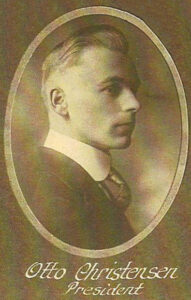
MWA 1922 Class Photo
Photo: Peterson Collection
The year I was 20, while in Dakota, I decided I must make something of my life besides just routine work on the farm. So I went directly to Maplewood Academy, Maple Plain, Minnesota, from the harvest field as I knew if I went home, my father would not hear to my going off to school. I wrote and had my mother ship my things in a trunk from home. I believe I can say the Academy days were the happiest days of my life even though I had to work to earn my way. Maplewood Academy has since been moved to Hutchinson, Minnesota, and the old place and buildings disposed of. Snowballing, skating, baseball, fellowship with other Adventist young people of which I had been deprived, and, of course study, stand out as bright spots in my life. We named our baseball teams one year “Beans” and “Prunes” because these had composed most of our diet that winter.
The summer times from then on until I had finished two years in college and entered the ministry were spent in the colporteur work—five summers in all and always the same partner, Marcus Odegaard. Our first summer together was in the southeastern county of Minnesota. I started out with fear and trembling with no field agent to assist or show me how. But the Lord blessed me with a 98% delivery of over $1,000.00. Marcus always exceeded me even though his English was very poor, having recently come from Norway as a very successful colporteur there. The next summer we went to Tennessee where the “grass seemed greener” and it was. We spent the whole summer in Hardin County where there was no railway and practically no roads of entrance. The majority of people had never seen a railroad train. Sometimes on Friday I had to walk 30 miles to get back to headquarters for Sabbath. That year I delivered over $1,600.00 worth and later had the privilege of baptizing a lady in Chicago who had first gotten acquainted with this message through a Bible Readings I had sold that summer. The next summer was almost a crop failure where we started, and so we had to move to a dairy county making our headquarters in Shelbyville, Tennessee. In spite of delay, I was able to deliver well over $1,000.00 worth. The next summer was spent in Hickman, Kentucky, and Lake County, Tennessee, working around Reelfoot Lake, the home of the “Night Riders,” to many of which I sold books. The Lord truly blessed us that year. I delivered over $2,100.00 worth and between us we put about 1,000 Bible Readings into that small county. But before the season was over, I contracted malaria and had to spend some weeks in the hospital which made me six weeks late my first year in college at Emmanuel Missionary College.
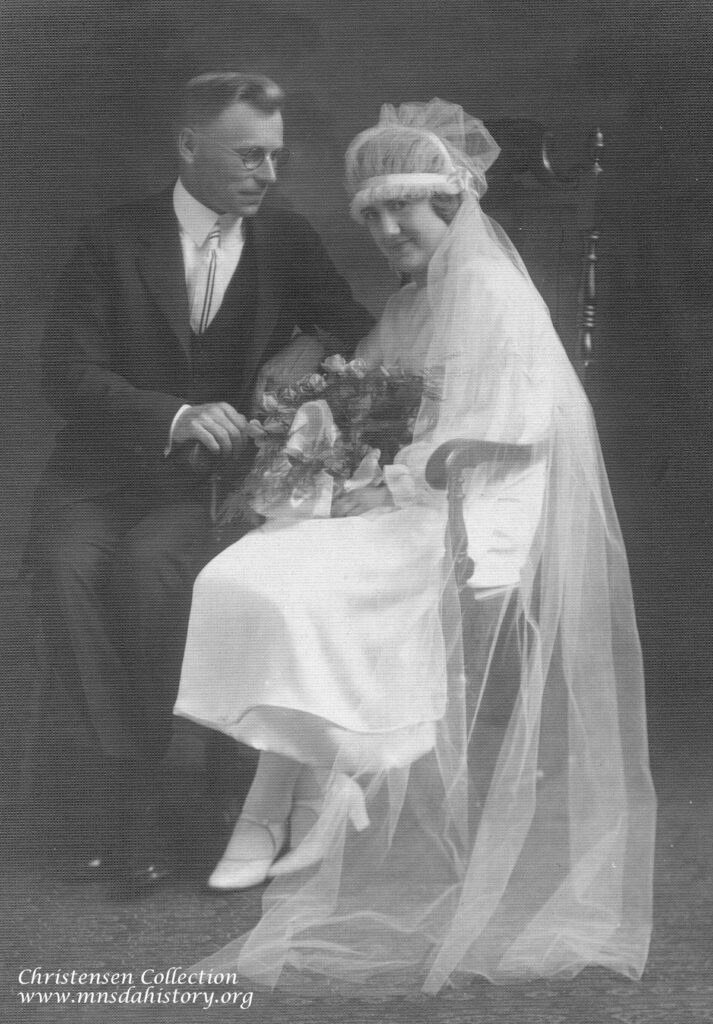
Photo: Christensen Collection
College, of course, was a new experience but I was thankful I had my scholarship and did not need to work to pay my way. After two weeks, I came down with a siege of malaria again and lost two weeks more but I was able to make up my work before Christmas vacation. I never had the privilege of going home for Christmas as I could not afford it, so my visits home were few and far between. New friendships formed at college have lasted all these years. I always said I had three months of hard work and nine months vacation. I finished in two years graduating from a junior ministerial course, which was given at that time, in 1924. It was during my last year that I met and fell in love with the one who was to be my companion, Dorothy Kocher of Lansing, Michigan. In our practice preaching, Levi Vixie and I chose the little town of New Troy and as Dorothy was a good story teller, we chose her to go along Sunday nights to tell stories to the children. I liked her so well that I thought it would be nice to have her tell stories to me the rest of my life. No more need be said about this except that the next year we were married and “lived happily ever after.”
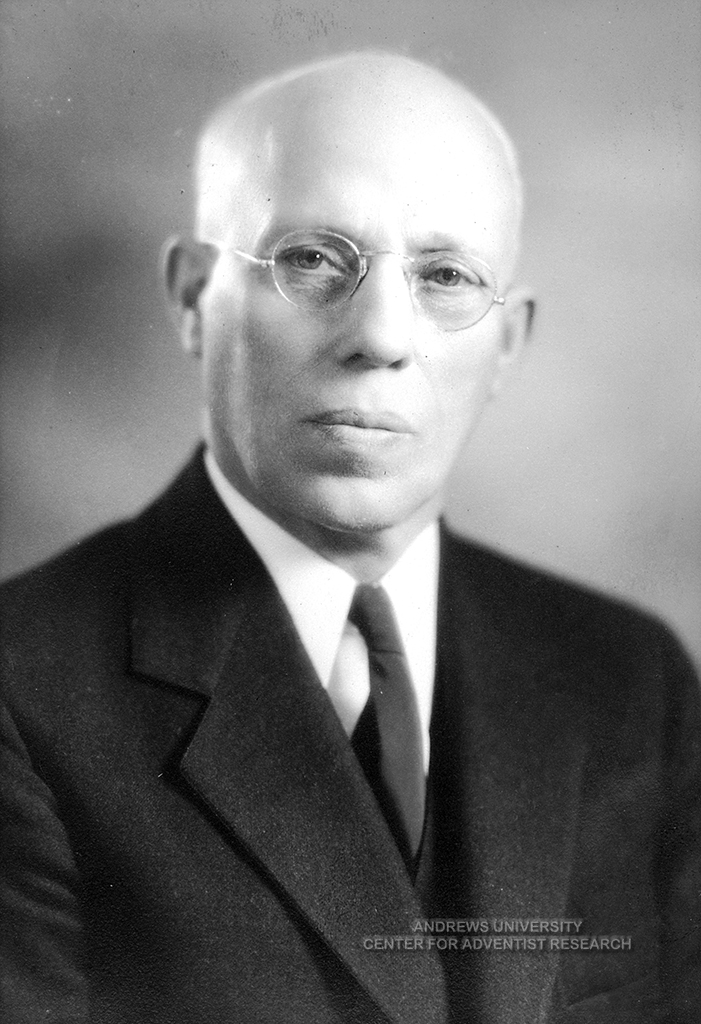
Photo: Center for Adventist Research
After finishing my Junior Ministerial course, I received a call from the newly elected president of the Minnesota Conference (my home state), Elder M. L. Andreasen. Six years were spent in pastoral evangelism in Minnesota holding efforts in Pine River, Eitzen, Pillager, Brainerd, Fergus Falls, Pelican Rapids, Barnesville, Detroit Lakes, New York Mills, Wadena, and Faribault, at the same time pastoring the churches in those districts. While located at Detroit Lakes our son Bruce was born. He was two years old when we went to Mongolia. We were about to move to the southwestern part of the state, where we had no churches, to carry on full time evangelism when we received a call to missionary service in the China Division. This involved a physical examination which we passed and the disposal of our car and furniture. Going right in the beginning of the depression we had to take a heavy loss. For instance an excellent used piano that we had paid $350.00 for we could not sell for any price. Finally the church bought it from us for $50.00.
That winter I had three summers: It was winter in Minnesota when I went to Alabama to say “good bye” to my oldest brother. There were oranges on the trees and it was raining. After leaving Lansing, Michigan, my wife’s home, we arrived Thanksgiving day at my parents’ home and it was 20° below zero and snowing. Then we stopped in Los Angeles to visit my sister where it was summer again. At San Francisco where our boat stopped for a day, as we embarked at Los Angeles, it was winter, but rather mild. At Christmas time in Honolulu we again had summer, and then gradually it got colder, first in Tokyo and Kobe and then Shanghai where there was a little snow and a damp cold, and then winter cold as we passed through Peking and on north to a higher altitude to Kalgan.
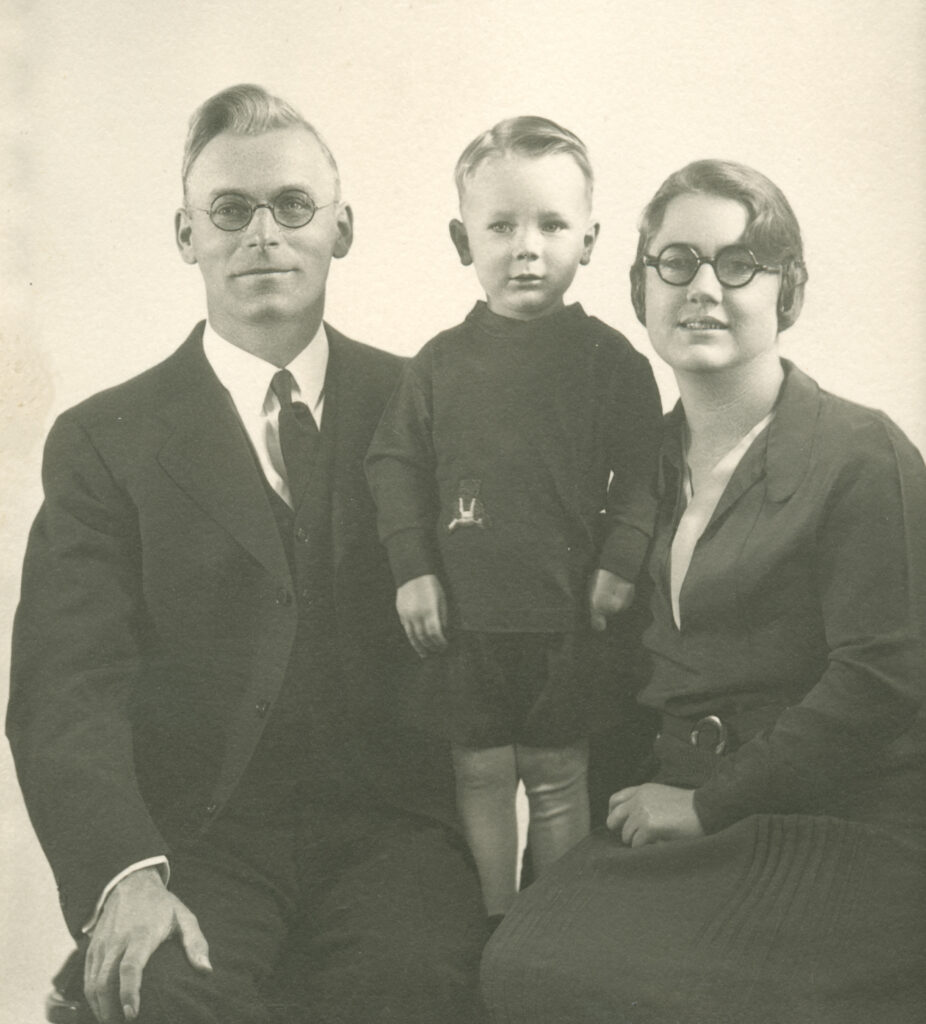
Photo: Center for Adventist Research
Collection 033, P000885
We had been called to northern China for evangelistic work and knew not that our destination was Mongolia until we arrived in California on our way. Altitude and wind I disliked most of all in weather from my Dakota days, and here we were going to a country where not a tree stops the wind blowing from Siberia. We arrived in Kalgan, China, on the border of Mongolia, where the old Great Wall built in 200 B.C. passes, about 9:00 p.m. on Thursday, January 8, 1931. [Editor’s note: The correct date is likely January 22, 1931, as that is the date Otto uses in his published sources such as his book, “Mission Mongolia”, pg. 14-15, and his article, “Mongolia Opening Its Doors” in the Adventist Review and Herald, June 11, 1931, pg. 12. In his 1931 diary, his entry for January 17, 1931, states that they were in Peking that day and Peking preceded their journey’s destination of Kalgan.]
The mission had just bought a house and compound for the Mongolian Mission and a nicer house and larger compound for a proposed hospital from a Mr. Larson, called “The Duke of Mongolia.” He had left a bathroom water heater in the house that would heat one bedroom, and had kindly set up a bed for us for the night. Our North China Union superintendent, Elder George Appel, was with us from Peking and stayed over with us until Sunday to help us get located. On Friday he found a Mongolian teacher, who was to come Monday, and got in touch with a furniture maker who was to make our furniture. So we set up house-keeping with what little we had in our trunks and some boxes, etc., until in a month or so we could get our furniture. Thus we were left alone to begin our mission work. We were happy and fortunate to have Mr. Larson as our neighbor and he was always willing to translate and help us when we requested him. But sign language worked very well when we went shopping. However, what we couldn’t see we couldn’t buy.
On Monday morning we started language study eight hours a day with our teacher. But this was Mongolian and we were in a Chinese city. Besides I had four Russian workers that I was to supervise as well as supervise the building of our hospital with the help of a Chinese interpreter. But it usually worked better without him. Our teacher arrived Monday morning and what he said we did not know but we guessed it was “Good Morning.” He finally took up a pencil and said, “Ene yu baina?” As we listened we noticed it was a question. Then he answered, “Ene pir baina.” We soon discovered that he asked, “What is this?” The one word different in question and answer was “yu” and “pir.” Therefore, “yu” was “what” and “pir” was “pencil.” Now we had the key to the whole language. We could ask the question and from his answers we soon built up a vocabulary. After six months when the Russian workers moved up on the plains, my wife took over in our little Mongol chapel in Kalgan as Sabbath School superintendent and I taught the lesson and preached in Mongolian. Perhaps the Mongols could not get so much but we got a lot out of it.
Ten years (1931–1941) were spent in Mongolia: learning the language, building two mission stations, setting up a Mongolian print shop, casting the type and teaching Mongolian boys the art of printing with no former training myself, publishing tracts and one book entitled “The Way of Life,” selling it in the summer on our medical missionary journeys by oxcart or camel, and opening a school for boys. To begin this school it was necessary to write a Mongolian grammar in Mongolian as there were none available, and provide other books and a class room. With no mission funds for such a project we brought down about eight boys and provided them with half time work and pay, much of it on our own expenses, thus providing them enough for their board. We sent one young man whom we had baptized who had a fair education in Chinese to our Chinese college near Nanking. While we supported him we took care of his wife by having her copy the Old Testament by hand at so much a page which provided her a fair living. No Old Testaments were available in print for purchase. They were all sold out years ago, so we borrowed a copy from the Bible Society.
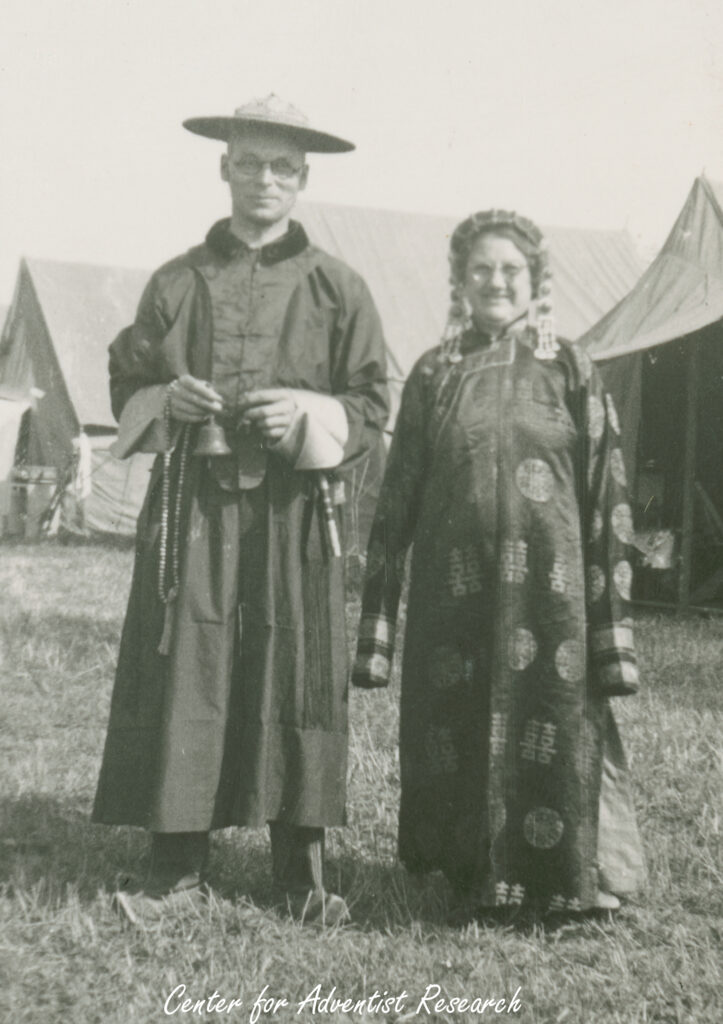
Photo: Center for Adventist Research
Collection 033, P000886
Sometimes we assisted our Dr. Elmer Coulston who had come up to be the doctor at the hospital built during our first year in Kalgan. He and his wife Leatha (Wenke) were old college friends. He conducted a downtown clinic and most of the patients were T.B. cases. As a result, my wife contracted T.B. and was confined to her bed for two or three months and also was expecting our second child. It was advised by the doctors that she be moved to Shanghai, due to her condition, so the baby could be born by Caesarean section. Mrs. Coulston accompanied us as she was a nurse. To say the least, this was an inexpressibly frightening experience as my wife must be kept on her cot the whole distance and we had to change trains three times. In crossing the Yangtze River there was no railroad bridge so she must be lifted over the railing at the railroad dock and lowered by coolies down to the ferry about eight feet. It was with great relief when we could deposit her in our hospital at Shanghai under efficient care. About ten days after I returned home, I received a telegram that our daughter Ilene was born and mother and child was doing as well as could be expected. However, shortly after returning home Ilene developed celiac disease and until we returned on furlough she mostly lived on a banana and sour milk diet due to her inability to handle proteins.
Each trip made up into Mongolia was beset by the danger of bandits. Many times the Lord delivered us almost by a hair’s breadth, sometimes being escorted by soldiers that circumstances made available at the last minute. Time slipped by very rapidly, and before we realized, it was time for furlough which was spent at Union College in obtaining my B.A. degree. I had earned 15 hours credit from Home Study Institute and a language teacher in Chinese and I was allowed 16 hours for my Mongolian work. With these credits and by carrying an 18 hour load I was able to finish in one year. I also had to study geometry on the side and take a test as that had become an entrance requirement.
Soon it was time to go back. My father had passed away six months after we had gone out the first time, so mother was left alone. My younger brother John was home with her on the farm. This time it was not a new experience but instead it was returning home. However, there were things that distressed us. War had come to China and the Japanese had bombed our house and taken over all of Inner Mongolia and our area of China. We could only get booking as far as Japan, but by special arrangement the Dollar Line arranged for us on a Japanese ship from Japan to Tientsin. At Tientsin our radio was confiscated by the Japanese but several days later released under pressure from the American and British representatives of their respective embassies.
Things were now becoming more difficult as time went on. We were required to have military passes for travel and our plan for building up in Mongolia was delayed although we had completed a small school set-up with plans partially realized for an industry.
Because of circumstances developing, including my wife’s heart being affected by the altitude, the Chinese work in the Chahar and Suiyuan provinces were combined with the Mongolian field and I was made director of the combined mission, called the Cha-Sui Mission. Another man was to come out and work into the Mongolian work. With this it became necessary for me to work in both languages and in our general meetings to translate for our Russian workers from Chinese into Mongolian and vice versa when they would speak and give their reports.
Threat of war left everything uncertain, and our area in particular. Finally, while in committee meeting at Peking word came through from the division office at Shanghai that all women and children and unneeded men were to return to the States. One of the luxury Mattson liners was picking up passengers, including our boy at the Academy in Shanghai, and would stop at Tientsin to take on the women from North China. This was Sunday and the boat would be at Tientsin on Thursday. Of course, there was no choice, my wife would have to go. I phoned her from Peking on Sunday and she began selling our furniture and packing as she with baggage would have to be in Tientsin Thursday. I got home on Monday and we had until Tuesday evening to have everything packed or disposed of. Her trunks and two crates must be down at the Embassy by 10 a.m. Thursday as the U.S. Marines were loading all on one freight car and taking it through to the boat. This was a sad farewell for all concerned as we who were left behind did not know what was in store. I was to stay in Peking.
One month after the boat had sailed I came down with typhus, a disease from which only 10% of foreigners escape fatality. Our two doctors and the embassy personnel urged that my wife return immediately by air, if possible, although at that time there was practically no air service, but the General Conference brethren did not think it was wise. The Lord watched over me and answered the many prayers, even though I was extremely weakened so that I could not lift my hand to wash my face in the hospital. I gradually began to regain my strength and in about three months I was able to leave the hospital. After a couple of weeks of gaining a little strength for traveling, I was returned to the States and my family in March 1941. It was only a few months later that Japan struck at Pearl Harbor.
During that summer I was able to attend our Seminary in Washington for the summer term. In the meanwhile, I was invited to the Michigan Conference and was stationed at Bay City with five churches in my district. We reopened the church school that had been closed for years, and now is still going strong. Also, while there in the district for three years I held four series of evangelistic meetings in four of the churches, we purchased and paid for a beautiful lot for a new location of our church which at that time was quite undesirable where it was. I also spent six weeks in loan to the government during the war as an employee for the army map service to work in Mongolian as I was the only one in the United States who could read, write, and speak Mongolian. I worked largely on the Russian army maps that Wilkie had sneaked out of Russia on his round the world trip. Having worked with our Russian brethren and translated a Russian-Mongolian dictionary I was able to read the Russian and pronounce its sounds even though I did not know the meaning of the words. However, I could use a Russian-English dictionary.
After three years in Bay City, I was given a leave of absence to finish my M.A. at the Seminary. I had saved up several hundred dollars from my work for the government at $25.00 a day, and then with my wife doing practical nursing we were able to manage on our own. How wonderful it is to have a wife who stands by you! As I was finishing up my work on my M.A., the way opened up for me to go on with graduate work toward my doctorate. I was invited to be pastor of the Humboldt Park Church in Chicago on two-thirds pay with the privilege of taking work at the University of Chicago. So on Monday, Wednesday, and Friday I attended two classes in the forenoon, studied a while at the library besides studying while “strap hanging” on the “L” as it would take me an hour or so to get to the University.
Having finished about ten courses and having passed my preliminary examinations in my second year, I was invited by President Alvin Johnson to join the staff at Emmanuel Missionary College with the promise that I could have the summers off in Chicago. In the fall of 1947 I joined the staff at E.M.C. and my wife was able also to take a little school work besides nursing occasionally and looking after the family. In the spring of 1951, having passed my finals and my dissertation on “The Scholia of Bar Hebraeus” being completed and accepted, the Ph.D. degree in Literature and Culture of the Near East was conferred on me. What a relief, for in the meanwhile I had also been working on one of the books of the Old Testament for the Adventist Commentary.
In the summer of 1955 I received a scholarship from the New York University to attend the Israel Workshop in Palestine with all expenses paid for six weeks except the travel from here to Palestine and back. While there, before the workshop, I had the privilege of visiting Rome, Egypt, Mt. Sinai, Beirut, the Cedars of Lebanon, Baalbek, Damascus, Byblos, Tyre, Sidon, and Palestines’ places of interest on the Jordan side. In Israel we were taken by bus from one end of the land to the other. No place was forbidden.
Just before leaving on this trip I was invited to be acting head of the Division of Religion at Southern Missionary College while Elder Banks was away at the Seminary, and my wife to teach foods and nutrition in the Home Economics department. Elder Banks returned for one year and then upon his leaving I was made head of the department. We spent eight pleasant years (1955–1963) there in the sunny south so that we decided to retire in that area. In 1963 Dr. Rittenhouse invited us to connect with Andrews University substituting for one of the young men away obtaining his degree. I was 65 but I was still kept on full salary as I wished to finish out my 40 years before retiring. In 1964 I retired and we moved back to our newly built retirement home on Watts Bar Lake at Spring City, Tennessee.
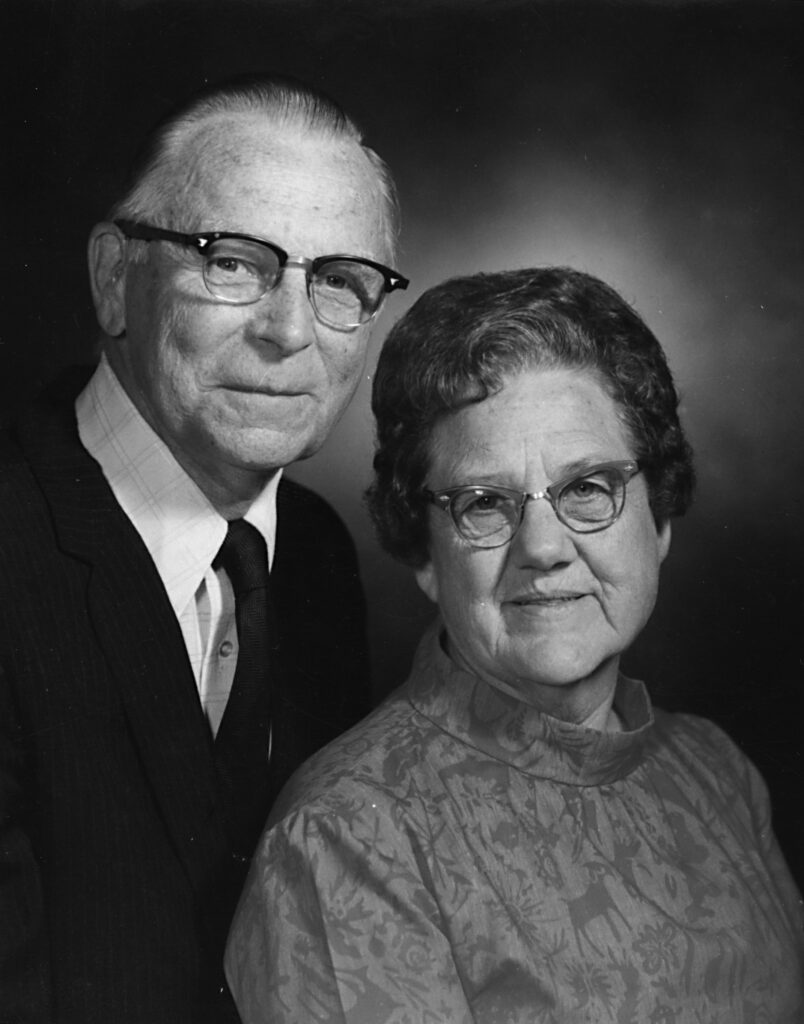
Photo: Center for Adventist Research
Collection 033, P000888
However, we were not permitted this luxury for long. As soon as Oakwood College heard we were free, letters and phone calls from president Pinkney finally persuaded us to help them out for one year. We lived at home but commuted weekly Monday morning, returning Wednesday afternoon. They kindly provided a house for us while we were there. And as Dr. Paul Quimby, then retired and living at Collegedale, also was teaching there, we commuted together from Chattanooga each taking turns driving. I taught the Greek and Hebrew classes and my wife was in charge of the Home Economics Department. They wished us to continue on the second year, but inasmuch as we had previously made plans for a world tour, we asked to be excused.
In the fall of 1965 we began our world tour—part by plane, part by train, and the remainder by boat. We spent a month in Europe with a Eurail pass visiting most of our educational institutions in England, Denmark, Norway, Sweden, Holland, Germany, Belgium, Switzerland, France, and Italy. It was a real joy to meet so many former students in nearly every place we stopped. From Rome we flew to Benghazi, via Tripoli, where we spent a week with Dr. and Mrs. Ludington, and my wife put on a cooking school. While there we visited the ancient ruins of the Greek cities on the coast of Cyrenecia, and then on to Egypt where we visited the Valley of the Kings near Luxor and other places of interest. Departing from Port Said the rest of our journey was largely by boat, stopping for a day each at Bombay, Penang, Singapore, Freemantle, Australia, Adelaid, Melbourne, and Sydney where we disembarked and spent a month in the “land down under.” We had the privilege of attending campmeeting for a week at Adelaide, crossing the continent and back by car. Here I was asked to speak a number of times and my wife helped Miss Schluntz, the division dietitian, in putting on a series of cooking lessons and demonstrations.
After a most pleasant stay in Australia where we visited again with former Russian workers in Mongolia who had moved down to escape the communists, we embarked on a French ship for Panama. The boat stopped to load copra for two days each at Santo, New Hebrides, at Port Villa, New Hebrides, at Noumea, New Caledonia, at Tahiti, and a few hours at the Marquesas Islands. Flying from Panama to Managua, Nicaragua, we spent several days with former students, Donald Crane and wife Dianne nee Ludlam, and then to Miami by plane and home by bus having been gone six months.
Again we were called back to Andrews University, my wife to teach in the Home Economics Department and me to be acting Seminary librarian for the year 1966–67, then to final retirement. My wife is still on half time with Andrews University being put in charge of the Food Service Directors’ Program which requires considerable travel as well as teaching in the summer workshop. Sometimes I act as her chauffer. In between times I have been doing some writing—a book accepted by the Review and Herald Publishing Association and a number of articles for our publications as listed below. In September 1969 I was asked by the Far Eastern Division to come to Manila for three years and teach in their graduate school which they are now developing. However, due to physical reasons it appears at present un-recommended by the doctor. So that perhaps will not materialize. In the meanwhile I am doing much reading and studying that formerly time prevented and also some further writing, and enjoying retirement while doing what we can to keep the little church at Spring City from dying.
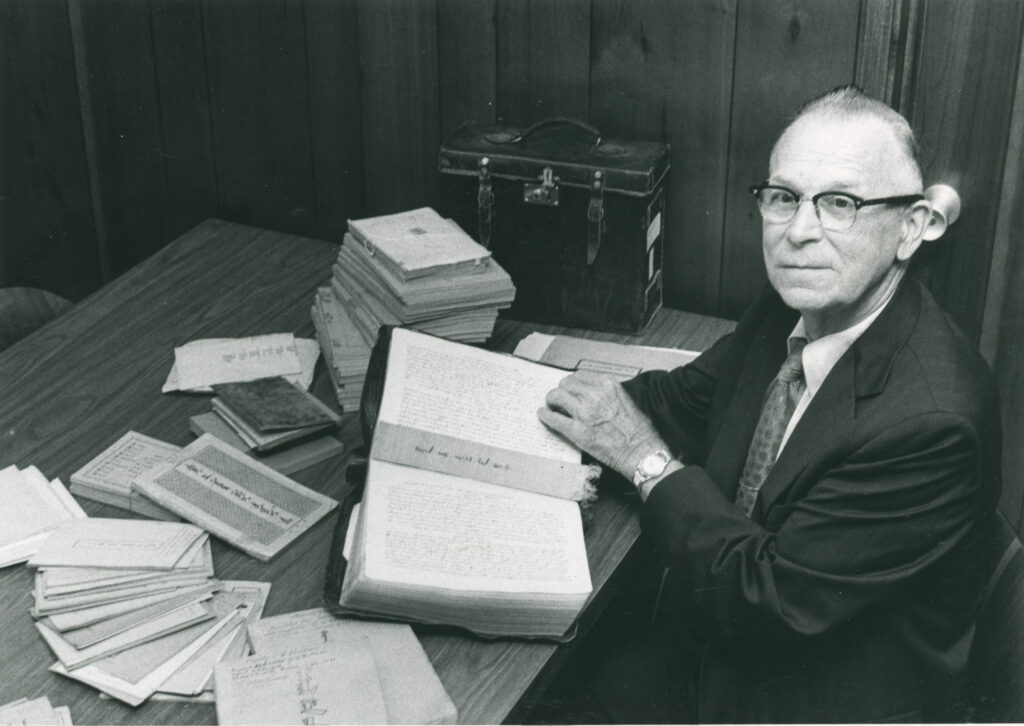
to Andrews University Library (Center for Adventist Research)
Photo: Center for Adventist Research
Collection 033, P009969
Our son Bruce received his B.S. degree from Emmanuel Missionary College and is now living near the University on Lemon Creek Road. He is married to the former Marilyn Kidder and has three sons and one daughter, all four attending school at Andrews. Bruce is Manager of Engineering Services for Clark Equipment Company at Benton Harbor, Michigan. He is also elder of the Buchanan Church. Our daughter Ilene completed two years of college before taking up her nurses’ training and was graduated from Columbia Union College with a B.S. degree in nursing after completing one year of her training at Loma Linda. She is now married to Dr. Donald Caster, a dentist practicing in Oswego, New York. They have two boys and both she and her husband are active leaders in church work there, for which we are thankful. Our life has been full and full of blessings from God.
Additional Resources for Otto H. Christensen:
Christensen Autobiography (recorded above) – PDF
Christensen Sketch – Southern Accent, February 7, 1963
Partial Bibliography from Autobiography:
Articles
The Ministry
“Lamaism, Satan’s Great Counterfeit,” April-May, 1940
“Music and Song a Part of Worship,” April, 1946
“Paul’s Defense Before Agrippa,” October, 1948
“Fostering the Spirit of Worship,” May, 1950
“The Melchizedek Priesthood,” January, 1955
“Isaiah 65:20 Research,” February, 1954
“How Can We Get the Most Out of Our Bible?” June, 1959
“Jesus and the Trinity,” June and July, 1961
“Myopic or Hypermetropic,” July, 1962
“Do You Know Truth?” October, 1962
“A Gift or a Loan,” May, 1963
“Does ‘Anti’ in the New Testament Mean ‘Against’?” November, 1963
“Motives,” April, 1964
“Are Brain Barriers Necessary?” April, 1965
“Subjective and Objective Religion,” November-December, 1965
“I Am Leaving an Inheritance,” October, 1966
“True Versus False Values,” February, 1969
“How Preachest Thou?” (as yet unpublished)
The Church Officers Gazette
“The Prayer of Faith in Mongolia,” 1937
The Youths’ Instructor
“Will You Do It?” (n.d.)
“If You Only Knew,” December 28, 1954
“From ‘Yang Kuei Tze’ to ‘Friend of the Chinese’,” March 27, 1945
Review and Herald
“Good to be an S.D.A.,” March, 1966
“Through Daniel to Us, With Love,” October 16, 1969
Series of four Articles on Ephesians, 1964
Ighereth (Publication of Association of Professors of Hebrew)
“Learning and Loving Hebrew,” March, 1961
These Times
“You Are Made to Do Right,” June, 1966
“The Three Angels’ Message,” November, 1966
“Are You Saved?” March, 1968
“Does It Make Any Difference?” November, 1969
“Why the Jews Failed to Accept Christ” (accepted—unpublished yet)
Southern Tidings
“The Law of Giving,” December 17, 1958
“Is the Ministry Your Calling?” August 5, 1959
Still Waters
15 articles (accepted August, 1969)
Miscellaneous Publications
Problems of Translation (book)
Research article on 2 Peter 2:9
Research article on Luke 2:33
Seventh-day Adventist Encyclopedia
Articles on “Soul” and “Jehovah”
Seventh-day Adventist Bible Commentary, Vol. II
Commentary of Joshua
Becoming Acquainted With God
book accepted by Review and Herald Publishing Association in 1968, in process of publication as of October, 1969